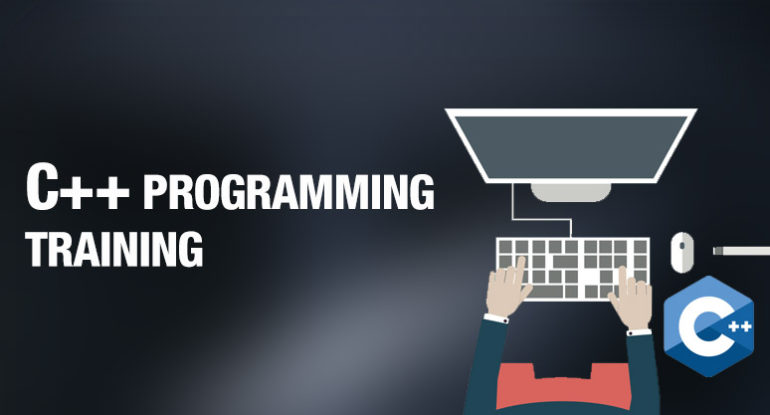- Home
- Database
- Networking
- Programming
- Online Courses
- Mobile Application
- Web App Developments
- Cryptocurrency Wallets and Mining Coins
- Q# Programming
- BlockChain Application Development
- Java Servlet Programming
- Java Training with Spring
- Developing Images with Docker
- C++ Training
- Python RPA Programming
- Excel VBA Training
- Ruby on Rails Training
- C# Training Course
- Testing
- Automation Test Engineer
- Penetration Testing
- Cucumber BDD
- Selenium Web Test Training Java
- Selenium Test Automation with PHP
- Selenium Test Automation with C# .NET and NUnit
- Android Appium Test Automation
- Online Performance Testing
- Python Automation Testing with Selenium and BDD
- Automation Test Architect
- Automation Test Analyst
- SpecFlow Automation Testing
- Contact
- About Us
C++ Programming Training Course
Course Overview
C++ is a general purpose programming language that is, statically typed, free-form, multi-paradigm and compiled. It is regarded as an intermediate-level language, as it comprises both high-level and low-level language features. C++ was developed in 1979 at Bell Labs. C++ was originally named C with Classes, adding object oriented features, such as classes, and other enhancements to the C programming language. The language was renamed C++ in 1983. This is a fast-paced course to the C++ programming language. It is intended for those with little programming background, though prior programming experience will be beneficial.
Course Objectives
At the end of this course the candidates will be able to
- Understand and use the programming constructs of C++,
- Understand various C++ data types and implement data structures,
- Using exceptions in C++ programs to catch or throw errors,
- Allocate and deallocate memory in C++ Program,
- Apply object-oriented concepts to software problems in C++,
- Create Static and Dynamic Libraries and use them in C++ programs,
- Write window applications in C++,
- Create C++ Templates to handle genric data types,
- Write Managed Code in C++, and
- Develop Database Application
Course Start Dates
| Start Date | Time | Day | Duration | Location |
|---|---|---|---|---|
| 10/04/2023 | 10.00 - 17.00 | Mon to Fri | 5 Days | Online |
| 24/04/2023 | 10.00 - 17.00 | Mon to Fri | 5 Days | Online |
| 05/06/2023 | 10.00 - 17.00 | Mon to Fri | 5 Days | Online |
| 10/07/2023 | 10.00 - 17.00 | Mon to Fri | 5 Days | Online |
| 14/08/2023 | 10.00 - 17.00 | Mon to Fri | 5 Days | Online |
| 25/09/2023 | 10.00 - 17.00 | Mon to Fri | 5 Days | Online |
| 16/10/2023 | 10.00 - 17.00 | Mon to Fri | 5 Days | Online |
Target Audience
Course Content
C++ Programming Training Course
- Introduction to C++
- Object-Oriented Terminology
- Abstract Data Types
- I/O Services
- Standard Template Library
- Standards Compliance
- Functions: Declaration and Definition
- Variables: Definition, Declaration and Scope
- Variables: Dynamic Creation and Derived Data
- Arrays and Strings in C++
- Qualifiers
- Object Programming Paradigm
- Orientated Programming Definitions
- Encapsulation
- Inheritance
- Overloading
- Overriding
- Hiding and Encapsulation
- Interface and Implementation
- Instances of Objects
- Objects  and Polymorphism
- Defining Classes in C++
- Classes and Encapsulation
- Member Functions
- Instantiating and Using Classes
- Using Constructors
- Multiple Constructors and Initialization Lists
- Using Destructors to Destroy Instances
- Friendship
- Operator Overloading
- Working with Overloaded Operator Methods
- Initialization vs. Assignment
- The Copy Constructor
- Assigning Values
- Specialized Constructors and Methods
- Constant and Static Class Members
- Memory Allocation
- Dynamic Allocation: new and delete
- Overview of Inheritance
- Defining Base and Derived Classes
- Constructor and Destructor Calls
- Overview of Polymorphism
- Standard Streams
- Manipulators
- Unformatted Input and Output
- File Input and Output
- Exceptions
- Inheritance and Exceptions
- Exception Hierarchies
- Inside an Exception Handler
- Database Technology
- Data Providers in .NET
- Connection to database
- Processing data
- Stored Procedures
- Database Transaction
- Database Locking
- Case Study
- Template Overview
- Customizing a Templated Method
- Standard Template Library Containers
- Adding Methods
- Invoking a Delegate
- Multicast Delegates
- Define process
- Attaching process to Thread
- Controlling Threads
- Stacks example
- Lists examples
- Design User Interface
- Button Click Events
- Writing code in events
- Run the Application




Dominic Everard – :
THE COURSE was good and covered a range of topics such as oop, linked lists, arrays, class design etc. i WOULd recommended it to beginners or low-INTERMEDIATE programmers who have just starting out in the field.
With myself being an intermediate programmer (having programmed in java previously), I found that I already knew a lot of the topics covered (however this did still solidify my knowledge and covered a few things I may have missed).
jINRUI HUANG – :
A WELL STRUCTURED COURSE FOR C++ BEGINNERS. IT COVERED MANY TOPICS COUPLED WITH GOOD TUTORIALS. THE INSTRUCTOR WAS EXPERIENCED IN C++ AND PATIENT TO ANSWER MY QUESTIONS. I HAVE WRITTEN CODES IN C++ BEFORE BUT NOT FULLY UNDERSTOOD THEM. THIS COURSE HAS GIVEN ME THE KNOWLEDGE AND CONFIDENCE TO WORK ON MORE C++ PROJECTS.
marclfleming, Troika-int.com – :
I found that the content the course covered was extensive and the exercises that the instructor set for me really helped me understand the theory. The instructor was kind enough to modify some of the content so that it would suit the challenges I will face at work. I would definitely recommend the course to beginners who are looking to start a career in programming. Thank you!